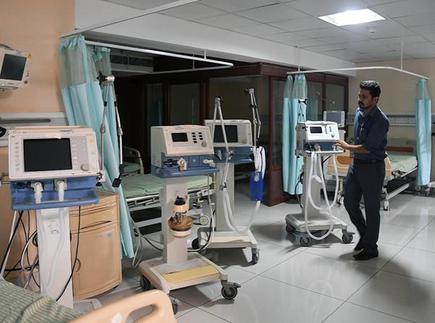2 companies that got ₹22 cr. advance in May later dropped from Ministry list.
Two firms given purchase orders for indigenously manufactured ventilators for COVID-19 treatment funded by PM-CARES have failed a clinical evaluation by the Health Ministry’s technical committee, according to information accessed through the Right to Information (RTI) Act.
 The pandemic led to a global spike in demand for ventilators, with several producing countries imposing export restrictions, and the cost of imported ventilators shooting up to ₹10-20 lakh each. | Photo Credit: The Hindu
The pandemic led to a global spike in demand for ventilators, with several producing countries imposing export restrictions, and the cost of imported ventilators shooting up to ₹10-20 lakh each. | Photo Credit: The Hindu
The firms — Jyoti CNC Automation and Andhra Pradesh MedTech Zone (AMTZ) — had already received ₹22.5 crore in advance payment in May, when the PM CARES allocation was made. However, by July, they were dropped from the list, according to the Ministry’s response to an RTI request filed by activist Anjali Bhardwaj.
Jyoti CNC is a Gujarat-based firm whose ventilators were slammed as inadequate for critical COVID-19 patients by the Ahmedabad civil hospital.
AMTZ is run by the Andhra Pradesh government. Although its ventilators were not included in the list of recommended suppliers post clinical evaluation, according to the Health Ministry’s July 20 response, the AMTZ orders were mentioned during an August 4 press briefing by Health Secretary Rajesh Bhushan.
Falling numbers
The reduction in the list of manufacturers post-clinical evaluation has cut down the PM CARES order for “Made in India” ventilators from the planned 58,850 units to 40,000, with price tags ranging widely from ₹1.6 lakh to ₹ 8.6 lakh per unit. Less than 18,000 units have so far been delivered for installation in hospitals.
As of August 3, only 0.27% active COVID-19 cases were on ventilator support across the country, said Mr. Bhushan, adding that at no time were there more than 1% of cases which needed ventilator support. This means that, cumulatively, there have been less than 30,000 COVID-19 patients who have required ventilator support since the beginning of the pandemic.
Recognising that the domestic demand for ventilators may not be as acute as earlier projected, the Centre lifted its export ban on August 1, allowing domestic manufacturers to start taking their products to the global market.
The situation was very different a year ago. In 2019, the annual supply of ventilators in India was only about 8,500 units, with 75% of the market share held by imported equipment, according to Mr. Bhushan.
The pandemic led to a global spike in demand for ventilators, with several producing countries imposing export restrictions, and the cost of imported ventilators shooting up to ₹10-20 lakh each. The Centre then calculated a projected domestic demand for 60,000 units and called for domestic manufacturers to step up production.
The PM CARES fund announced its first allocations on May 13, including a sum of ₹2,000 crore for the purchase 50,000 “Made in India” ventilators “for augmenting the infrastructure to tackle COVID-19 cases across the country”. These ventilators would be provided to government-run COVID hospitals in all States and Union Territories for better treatment of the critical cases, said an official statement.
On May 18, advisor to Prime Minister Bhaskar Khulbe wrote to then-Health Secretary Preeti Sudan asking for a detailed proposal for the purchase.
With GPS tracking
“I would request you to ensure that the manufacturers of these 50,000 ventilators are informed that the ventilators bear a distinct identity to show that the supply has been supported through PM CARES Fund. Further, all these ventilators must have an embedded GPS device so as to track their placement and operation,” said the letter, accessed through Ms. Bhardwaj’s RTI request.
On May 20, Ms. Sudan responded, promising to ensure the PM CARES logo and GSP chips on the devices, and noting that the Ministry had already placed orders for 58,850 ventilators at a total cost of ₹ 2,332 crore. This included 30,000 units from state-run defence manufacturer Bharat Electronics Limited at an order value of ₹1,513.9 crore, with ₹205.5 crore paid as an advance.
Ms Sudan’s letter also said that Health Ministry PSU Hindustan Lifecare Ltd (HLL) was tasked with procuring the remaining ventilators. On March 27, it had already placed a purchase order for 10,000 ventilators at an order value of ₹166 crore with an advance payment of more than ₹20 crore.
Other companies which received purchase orders by May 20 included Allied Medical (350 units at ₹30 crore, no advance), AMTZ for both basic and high end ventilators (13,500 units at ₹ 500 crore, ₹ 14.5 cr advance) and Jyoti CNC Automation (5,000 units at ₹121 crore, ₹8 crore advance).
The Ministry’s July 20 RTI response included the same list of purchase orders. Then it added, “However, the technical committee constituted under DGHS [Directorate General of Health Services], after successful clinical evaluation, so far recommended the following ventilators for installation in various States.” The subsequent list does not include AMTZ or Jyoti CNC.
On May 15, Ahmedabad civil hospital superintendent J.V. Modi had written to the State government’s medical services provider, saying that the Dhaman-1 ventilators manufactured by Jyoti CNC were “not able to bring desired results” according to the head of the anesthesia department. He asked the State provider to immediately acquire high end ICU ventilators instead. The opposition Congress party in the State has called for an inquiry.
With regard to AgVa Healthcare, the online publication HuffPost has reported that the government’s clinical evaluation committee report dated June 1 said AgVa machines “should not be considered as a replacement for high-end ventilators in tertiary care ICUs”, adding that “There should be a provision for backup ventilator in the facility where these ventilators are used.” However, they stayed on the list of vendors, according to the RTI response.
An investigation by The Hindu group’s Frontline magazine found that Allied Medical is the only manufacturer on the list with the required certification, accreditation and prior experience in making and supplying high-end ventilators. As of the first week of July, only Allied Medical had completed delivery of its order. Frontline cited clinical equipment industry experts who said that AgVa and AMTZ had no prior experience in manufacturing high-end ventilators, which is time consuming.
(with inputs from The Hindu | Mahesh Langa in Gujarat)
 Z-Morh Tunnel – File Pic
Z-Morh Tunnel – File Pic

